By Park Chae-youn, Kim Soeun, Kwon Yujeong, and Oh Serin
Many students dream of taking part in diverse club activities throughout their university life. It is through college clubs that students get to share precious memories and connect to college communities. As the new semester begins, a variety of clubs at Ewha, ranging from music and arts to sports and academics, have kicked off their recruitment of new members. Ewha Voice reached out to six clubs with engaging activities that welcome all students to join.
ESAOS creates harmony with passion for classical music
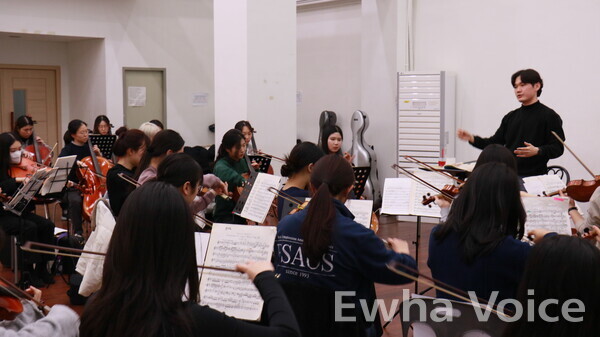
Music is a passion for many people, and Ewha students are no exception. Students have established several clubs which compose or perform diverse genres of music. ESAOS, which stands for Ewha Symphonious Amateur Orchestral Sounds, is the only central amateur orchestra club at Ewha where anyone interested can join. Founded in 1993, ESAOS has been active for 30 years, holding its 61st concert on March 2.
According to club president Shim Kyusol, a junior majoring in Nursing, ESAOS performs every March and September. Students who wish to join must have their own instruments and take an in-person audition after turning in an application.
“The best part of ESAOS is that you can be friends with students from various majors but share the same hobbies,” Shim said. “Many students think playing classical music is complicated, but we consider one’s passion and interest as the most important value when recruiting new members. I would like to invite Ewha students to join our journey of musical harmony.”
Concertmaster Choi Hyejung, a junior from the Department of Consumer Studies, introduced the pieces that ESAOS had prepared for the annual concert on March 2.
“We performed Symphony No. 1 in C minor and Piano Concerto No. 1 in D minor by Johannes Brahms, which we practiced for two months,” Choi explained. “One of the advantages of our club is that members are given an opportunity to play classical pieces which professional artists play, presenting a challenging yet rewarding repertoire.”
Moreover, Choi shared how valuable it was to unite with people with common interests to perform their best in the concert.
As members communicate in the language of music with their instruments, the club also welcomes international students as new members.
Maria Jose Munoz Leon, a Costa Rican student who recently graduated from the Department of Food Science & Biology, is a foreign student member of ESAOS. Munoz Leon said that it was her first time playing in an orchestra. While it was hard for her at first as she was not familiar with Korean musical terminology, she was eventually able to fully adjust with the help of the club members.
“Playing the violin at ESAOS was one of my most precious and joyful memories in my university life,” Munoz Leon said. “Foreign students may hesitate to apply for ESAOS due to their Korean fluency, but there are many foreign members and members who speak various languages, so there is nothing to worry about.”
DAE welcomes debate lovers to freely speak their mind
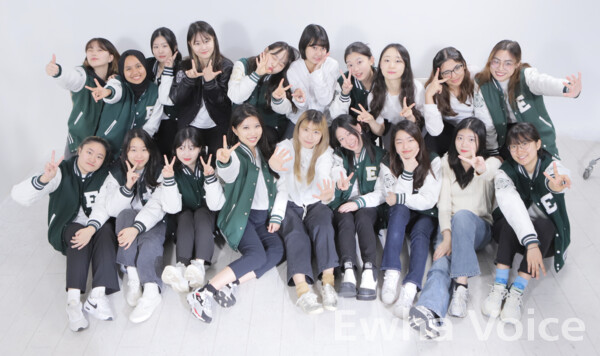
Debate Association of Ewha (DAE) is an inter-departmental debate club composed of members from diverse majors and ages with a shared love for debate.
The history of DAE stretches back to 2003. After the success of the speech and debate class by Professor Peter Kipp from the Division of English Language & Literature, the debate club started in 2005 by recruiting students from the major. Since then, it has continued its regular debate sessions every week excluding exam seasons. Anyone who loves to debate can apply for the club except students from the Division of International Studies.
The activities of DAE comprise three parts: interscholastic tournaments, regular sessions consisting of lectures and debates, and special joint sessions. As a part of the Korean Intervarsity Debate Association (KIDA), members of DAE debate with more than 10 other university debate clubs and build connections with students from other universities. DAE is a prominent debate club that has won many awards at both local and global debate competitions, including KIDA Open Rookie Finalists and KYUSHU Debate Grand Finalists.
“Our training focuses primarily on Parliamentary debate,” explained Iris Kim, the president of DAE. “However, we believe that learning to debate also instills lifelong skills like organizing your thoughts, articulating your arguments clearly and concisely, and coming up with ideas on the spot about topics stretching from international politics to love and relationships.”
Regular sessions at DAE are held bi-weekly, with an in-person session where students can learn the art of debate through lectures held every Monday, and a shortened online session on Wednesdays, where members have a mock debate. Additionally, non-debate activities such as trips and group dinners that cultivate memories and friendship also take place throughout the year.
“I joined this club partially because I had experience as a high-school debater, but also, as an international student, it is important to consider clubs that use English,” said Fatin Alya, the vice president of DAE. “DAE is a club with no language barriers and was easier for adaptation.”
Alya recommends DAE to both Korean and international students to improve their speech and brainstorming skills.
“As long as you have an interest in debate, anyone can join, including beginners,” said Alya. “DAE will teach you from the beginning, and you will be able to improve your debate skills as well as your confidence in speaking English.”
Dayeon gathers tea-loving students to bond with tea
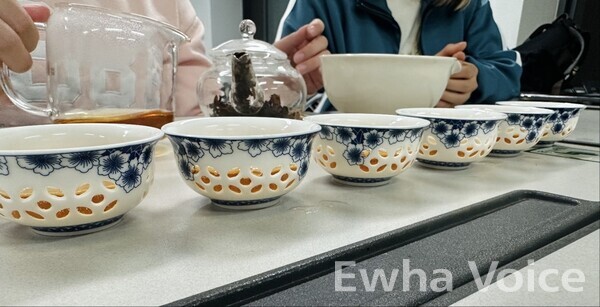
A tea ceremony, involving brewing and drinking tea, is a traditional way for many people to relax and relish its soothing flavors. Dayeon is a Korean tea ceremony club which consists of students who love tea. The club has a renowned history beginning in 2001, with the name of itself meaning “a group of people who love drinking tea.”
Anyone who likes tea can join the club even if they are not familiar with its theory or ceremony. There are no age or major requirements, allowing every student at Ewha including international students and exchange students to join. Dayeon recruits on a first-come, first-served basis, allowing anyone to apply without the burden of an admission interview.
Dayeon has five regular meetings every semester. At every meeting, students learn about tea theory and the process of its ceremony, as they gather together to talk whilst drinking their favorite tea. During Ewha’s Daedong Festival in May, Dayeon sells homemade milk tea and black tea syrup. Before the final exam week, members go on a trip to Hadong, a county in South Gyeongsang Province famous for green tea, to experience how tea is made. During the fall semester, Dayeon has a special Homecoming Day where members get to meet alumnae of Dayeon and have a meal together.
“For me, joining Dayeon was the best choice I made at Ewha,” said Lee Wonjoo, a former president of Dayeon in 2023. “The meaning of ‘yeon’ from Dayeon means ‘correct yeon (然)’ in Sino-Korean, but until now I thought it was ‘connection yeon (緣)’ as there are so many kind people in the club. I think the best part of being a member of Dayeon is that you can meet kind and caring people.”
“ There is no difficulty in participating in club activities,” said Nagao Mina, co-president of Dayeon. “I applied to Dayeon because I was part of a tea ceremony club in high school, and I have a personal interest in tea. I am very happy to meet many friends and seniors through Dayeon. I believe my time at this club will provide me with positive memories of my university life when I look back on it.”
Phototrace captures moments of college life in the click of a shutter
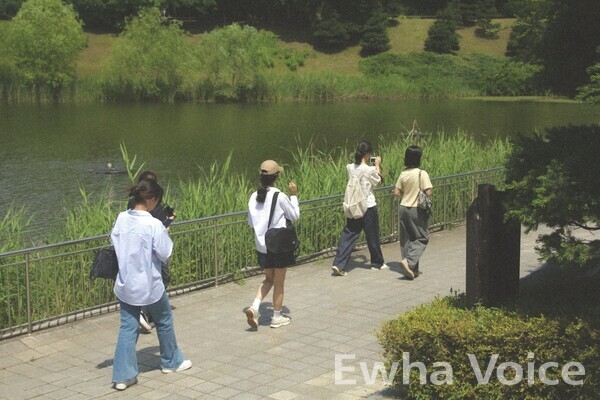
Photography not only captures the scene in front of the camera but also contains the precious memories of the moment that are recollected later on. Such devotion to photography can be seen in Ewha’s photography club, Phototrace, consisting of photography lovers from professionals to novices that aim to catch the fleeting moments of college life in the click of a shutter.
Along with fixed meetings held every Tuesday, members visit different places around Korea for photography on the weekends. Joowon Surh, the president of Phototrace and a junior from the Department of English Education, explained that not only do members of the club visit famous locations for photography, but they also stop by cafés for a drink, spending quality time with the group.
“I am sure many shutterbugs can resonate with the inner dilemma of whether to pass by or stop for a photo when you are with a group of friends,” Surh said. “But this club is where they could spread their wings.”
Besides visiting places, Phototrace holds two additional events: photography exhibitions and photo booths.
Photography exhibitions, held twice a year, display members’ photographs framed under a specific theme.
“The theme for our latest exhibition was ‘Infinity’ which showcased a collection of images to show how photographs can present timeless moments,” shared Sujin Jeong, the vice president of Phototrace and a junior from the Department of Fashion Industry.
Another event is the photo booth that is held during Ewha’s Daedong festival. Yuhyeon Nam, who majors in design and is head of the design department at Phototrace, explained that besides creating simple merchandise for sale, their own photo booth was made for students to take a snapshot of their time at the festival.
“There was an instance where a festival visitor who introduced himself as having shot around 400,000 people on camera and shot a group photo of us,” Surh added. “Moments like these are what makes our memories of the event truly special.”
Recommending the club to those who are interested in photography, Nam shared that Phototrace is a place to make friends with other people at Ewha and to spend time on their hobbies.
“Although I love taking photos, I was reluctant to visit special sites for a picture alone,” Nam said. “But with Phototrace, you get to meet friends to share the same passion as you do.”
Ecock energizes life at Ewha in full swing
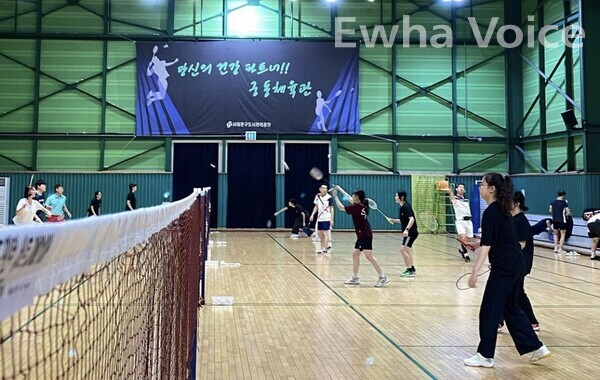
Engaging in sports in college not only yields a healthier physique but also a stronger mentality to face life’s challenges and a group of colleagues to share such experiences. Ecock, Ewha’s badminton club, offers these benefits with badminton practices held twice a week.
“Regardless of age or nationality, Ecock is a club where everyone can gather together for badminton,” said Im Yubin, the co-president of Ecock and a junior from the Department of Climate and Energy Systems Engineering.
Usually taking place at a gym near Hongdae, the badminton practices are held in rotation according to the number of courts available. However, the waiting players warm up for their turns without pause until a court opens up.
Ecock also holds friendly competitions with badminton clubs from other schools. Last year, Ecock participated in a match between schools from the north western regions of South Korea and also in a mini seasonal league with Hongik University where members from each club were mixed into two teams. Members from Ecock enjoyed the interaction with other schools because they were able to play with new players and expand their horizons.
“There is often a more intense atmosphere and attitude when playing with new players,” said Lee Chae Eun, another co-president of Ecock and a junior majoring in Environmental Science and Engineering. “Also, we get to interact with them after the match.”
Maintaining an active schedule, Ecock does not forget about special holidays. During the Christmas season, for instance, Ecock members decided to dress up according to the holiday’s theme for their badminton practice.
“I remember it was quite an intense match where teams were divided and a prize was awarded to the winning team, but only with red Santa hats on,” Im said.
Siti Hajar Asyiqin Binti Fazillah, a Malaysian student who goes by Hajar and is a sophomore from the Department of Computer Science and Engineering, shared that she joined Ecock after discovering the club on Ewha’s official website and its social media account.
“The two main reasons why I decided to join Ecock were to meet new friends and to have opportunities to exercise,” Hajar said. “To be honest, I was a little worried about fitting in as the only international student, but there was nothing to worry about after meeting the members.”
As the current publicity and engagement team leader at Ecock, Hajar also added that she recommends Ecock to those who want to enjoy college clubs without much pressure, especially international students who want to participate in at least one club during their time at Ewha
EILC connects Ewha to courts worldwide
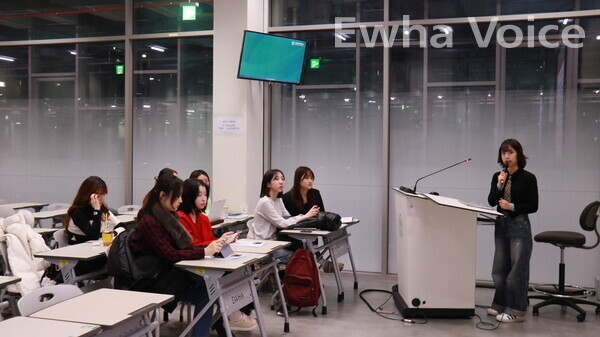
It is difficult to understand how to deal with legal problems if you are not familiar with them, especially when the issues are not limited to a single cultural background. In a diverse community like Ewha, students who plan to study jurisprudence often face these obstacles. Ewha International Law Club (EILC) is ideal for those who want to be part of judicial discussions.
EILC holds weekly sessions where they study international law and debate on various social issues. It was launched in 2014 by students interested in law following the dissolution of the Department of Law.
The club’s yearly curriculum consists of weekly social debates and a special mock trial, as well as group studies on international law. Especially in special sessions, the members of EILC take on the roles of the judge, defendants, and prosecutors of international courts. They then prepare and act out the parts of a global trial consisting of particular themes. Professor Won Kyung Chang from Scranton College, the supervisor of EILC, highlighted the unique aspect of the club that cannot be experienced during regular classes.
“It is quite meaningful that students organize the international mock courtroom by themselves in EILC sessions,” Professor Chang said. “International law is a very sophisticated part of jurisprudence. You cannot easily experience its actual application when you are an undergraduate.”
“We regularly study international law together by reading and sharing the information of given parts,” explained Lee Sooyoung, the president of EILC and a senior from the Department of Political Science & International Relations. “We prepare and solve quizzes ourselves for a thorough understanding. We can handle international law correctly by combining our knowledge.”
Lee also introduced the weekly debate about various social issues in regular sessions. Members need to arrive at their opinion using reasonable proof to develop their logic.
“Still, the most attractive point of EILC is the international mock trial,” stated Park Seeun, a junior from the Division of International Studies who is an EILC member. “It is such a special experience to take part in an international court. We prepare the defense or make a final judgment from several positions, considering various cultural and historical backgrounds. After the session, you can feel your knowledge has been broadened.”
The members recommend the club to those feeling frustrated over the lack of information about judicial careers.
“Once you enter EILC, you can connect with a broad network of our alumnae currently working in judicial careers,” Lee said. “They are sincere and concerned enough about the current members to offer valuable advice on annual homecoming days. EILC will give you a fruitful experience throughout your college life.”

